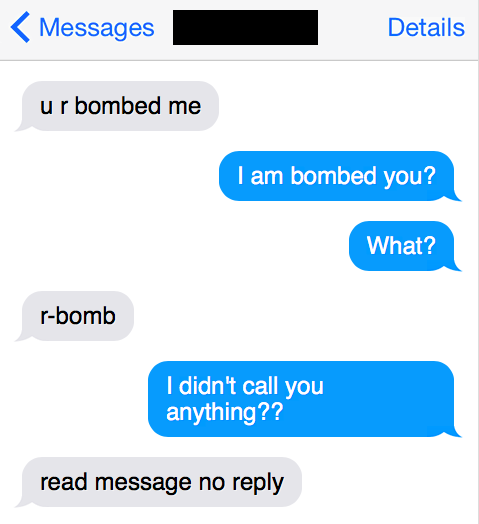“U r bombed me,” read the notification.
My immediate reaction was, “What?” Several text bubbles later, I found myself engrossed in arduous digital warfare with this person, who believed I had ignored their earlier messages. I later learned that R-bombing means reading a message intended for you but not responding. The Rice University Neologisms Database explains that the term “[insinuates] the disappointment one feels when he does not receive any response from whom he texted to.” From my own experience with escalated misunderstandings over text messages, I am convinced that read receipts do more harm than good. These signals that supposedly confirm our awareness of a delivered message have distorted our perception of what is and isn’t an offence. If we receive a delayed reply, or no reply at all, after a certain amount of time has elapsed, we tend to interpret the other’s reaction—or lack thereof—as a direct assault on our ego. Timestamps that don’t accurately reflect when a person opens our message often result in unnecessary quarrels. Instead, we should consider a person’s words as confirmation of their awareness, rather than their read receipts.
Certainly, an advantage to activating read receipts is that they hold us accountable to not only responding, but doing so in a timely fashion. While Apple has made activating them optional, platforms such as Facebook Messenger and Snapchat don’t offer smartphone users the luxury of choosing blissful ignorance. Instead, we must confront the fact that our presumably busy texting partner did indeed “R-bomb” us.
Yet, equating read receipts with a recipient’s written acknowledgement of a message is a mistake. An opened message does not guarantee that the person with whom you are conversing has read your text in the true sense of the word. Their lack of response should not be viewed as them actively avoiding you, because the “R” may not be accurate or genuine. Keeping multiple browser tabs may easily lead you to unintentionally open a new message without actually having read it. Granted, it is difficult to entertain the possibility of someone inadvertently clicking your text while the obnoxious “seen” beside your last unanswered message is gaslighting you.
Lack of response, however, shouldn’t be viewed as active avoidance, or necessarily a bad thing. We communicate via text out of convenience, or when face-to-face interactions are simply impossible. In the middle of a heated argument, for example, instant messaging may even provide us with time to collect ourselves and carefully communicate our thoughts instead of exchanging words that we will surely regret.
Beyond making us question whether the person we’re texting really forgot to respond, read receipts contribute to larger problems with non-stop digital communication. We have come to expect that everyone we contact is constantly on their phones, anxiously awaiting yet another one of our oddly specific memes or clever comebacks. In truth, humans aren’t so devoted to online conversations—and frankly, they shouldn’t be. Our level of attachment to confirming read receipts and checking our smartphones betrays our insatiable need for validation. With our phones, as with any fickle relationship, we should consider that life may be more enjoyable when they are off. I am in no way urging that we part ways with technology—but we should accept that the deceptive read receipt is not our friend.
In the brief history of text messaging, timestamps have shown to be reassuring to some, but their use as provocation is also an irritant to many. Given that they aren’t a reliable form of acknowledgement, perhaps deactivating read receipts when possible is wise. Maybe getting away from your phone for a bit is an even better decision. Going forward, I’ve resolved to acknowledge messages that I have in fact read by responding with some sign of life, curt as it might be. At the very minimum, anticipate the passive aggressive text staple “k.” At the very most, look forward to an attempt at the next great Canadian novel followed by an unhealthy number of heart emojis. Texters, you’ve been warned.








